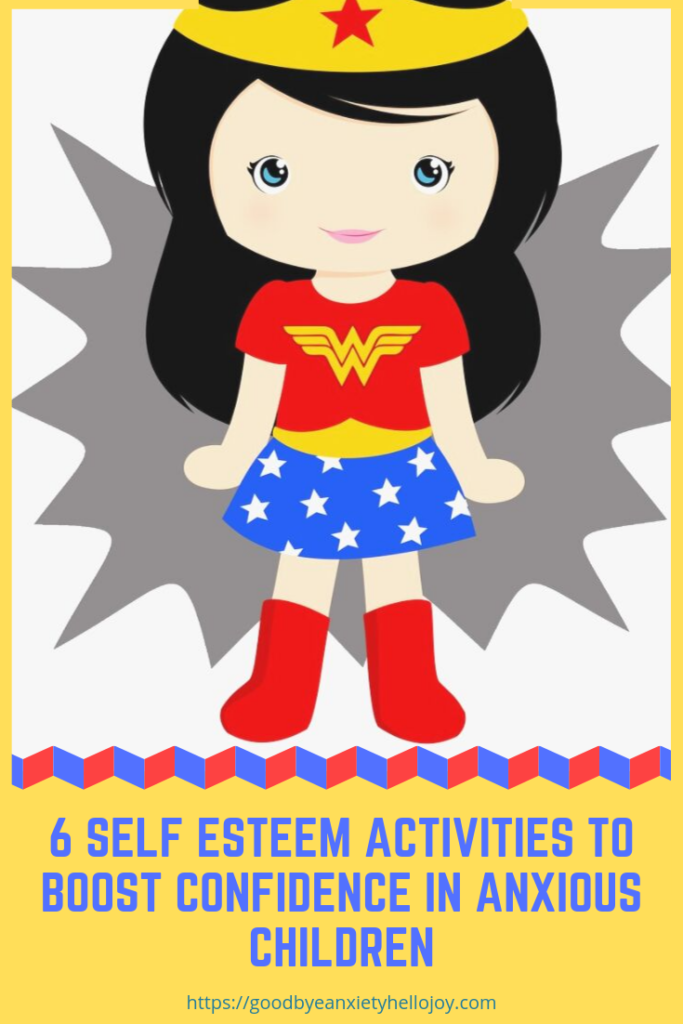
6 Self Esteem Activities to Boost Confidence in Anxious Children
Anxiety causes many issues for children…fear, stomachaches, isolation, lower grades, and anger. While each case of anxiety is unique to the individual child, there is one common factor among nearly all children with anxiety. Without fail, anxiety strips children of their confidence and self-esteem. It may start as losing confidence in one particular area, such as a sport or a school subject. However, as the anxiety spreads so does their loss of self-esteem.
Children who once ran onto the soccer field with the confidence to score now may question every thought from their ability to score, to what team members think of them, to the way they may look in their uniform. Anxiety has stripped them of their confidence and self-esteem. (Confidence refers to a person’s perception of their abilities while self-esteem refers to a person’s perception of themselves.) These self esteem activities and ideas will boost confidence in children with anxiety.
How Anxiety Strips Confidence and Self-Esteem
This same scenario continues to play out for a variety of reasons. Anxious children lose confidence in themselves as a friend, in their looks, in their talents, in their role as a family member, and so on. Sadly, once the confidence and self-esteem are lost in one area, it spreads like wildfire. As parents or educators, we are quick to help our anxious child find ways to manage their anxiety through calming skills and coping thoughts.
While these skills are necessary to win the battle against anxiety, we must work to boost self-confidence in kids using activities to build self esteem. It is a vicious cycle where anxiety will always win if left unattended. As children regain their confidence, they are better equipped to manage their anxiety as well. Just as anxiety can grow and spread (negatively), confidence is also contagious!
Anxiety is a worry or unease about an event or feeling. It goes without saying, if someone is confident in themselves in relation to an event or feeling, there would not be anxiety. There is nothing wrong with feeling anxious here or there, therefore, lacking confidence in certain areas. It becomes problematic when the anxiety becomes frequent, leading to a lack of confidence often. As confidence decreases, the anxieties increase. The opposite is also true: as confidence increases, anxiety decreases. Confident people realize they are able to handle situations and believe in themselves.
As with everything, it is important to know your child. Take these suggestions and make them work for your child’s needs, personality, and age. These ideas will help you get the ball rolling on building self-confidence in your child.
Let Your Child Know That They Are Not Alone In Their Anxiety
I think one of the greatest things we can do for anxious children is to let them know that anxiety is quite common. In many cases, like my daughter’s, her anxiety was so extreme, that she felt that there was no one else in the world with anxiety as bad as hers. While my anxiety is not as extreme, I began talking about situations where I felt anxious. I asked people in her life to share their stories about anxiety. Also, I found several online Facebook groups where parents frequently shared their child’s extreme anxiety.
Once I found this resource, I began sharing their stories with her. She commented on how she enjoyed hearing about others. It was important that I also find success stories about people suffering from anxiety. Recently, I discovered that actress Emma Stone has dealt with intense anxiety. We watched interviews with her and movies she starred in, highlighting how anxiety did not stop her from achieving her dreams. All of these situations built my daughter’s confidence and self-esteem, knowing there are thousands of people in the world just like her. Seeing that you can succeed in spite of anxiety is a huge relief for many sufferers. (As an added note, my daughter is also dyslexic. I have found numerous articles on successful, often famous people, who are dyslexic as well.)
Self Esteem Activity 1- Read a book such as “Wemberly Worried” by Kevin Henkes together and talk about your worries. Teachers, you can share this book with the whole class and everyone can discuss their fears.
Start Small and Build on Success
There are times that I really have to remind myself of this idea. We must start small in order to build success, and therefore, boost confidence. If your child is scared of the dark, have him or her spend just one minute in the dark bedroom alone. As soon as the one minute is over, let them know what a huge step that was. For older children, they often feel silly and embarrassed about the fact that they are only able to spend one minute in the dark. Remind them that they have nothing to be embarrassed about. Everyone must start small before they can succeed. These small steps build the strength to continue to spend more time alone in the dark until the fear is no longer present.
For a child who has anxiety over leaving your side, start with very small moments apart and work towards a bigger goal. Help your child set realistic goals based on their anxieties. Although the goal may be small, the importance is in the ability to achieve something that seems hard. This has worked incredibly well for our family. There are times I would try to push for steps that were too big, and the effort would backfire. Small steps lead to big moments.
Self Esteem Activity 2- Make a Calm Down Jar together. Have your child take the calm down jar into a room where he or she is alone. Using the calm down jar as a timer, encourage your child to spend a few minutes alone, away from you.
Capitalize on Your Child’s Strengths
No matter what your child fears or how broken they are at this moment, they are full of strengths. Reach deep and find these strengths and celebrate them as often as possible. Enroll your child in a class, if possible, that allows enjoyment in a particular area. Many children love art, although they may not be the most artistic. The goal is to enjoy the process and feel pride in their enjoyment.
For children who may not be able to attend extracurriculars due to anxiety, find ways to embrace their strengths at home. Ask older children to help complete a task that requires responsibility. Celebrate their ability to be counted on for help and maturity. My daughter loves helping younger children. She feels brave and helpful when babysitting the neighbor’s young boys. This same concept can be applied at school. Teachers can ask certain students to be responsible for a particular chore or task in the classroom.
Self Esteem Activity 3- Together with your child, make a list of your child’s strengths. Post this list somewhere visible and share with teachers at school. Add to this list as new strengths are discovered.
Encourage Effort Rather Than Results
Difficult tasks require continued effort. Facing an anxious event takes incredible effort. It is important that a child is recognized for the effort put forth even if the anxiety was not overcome. For a child who has school anxiety, with the ultimate goal of attending class, he or she should be congratulated on the effort it took to enter the school. Although entering the school was not the ultimate prize, effort was used and a small step was taken.
Children want to be recognized for the hard work they are putting in throughout the day. This gives them the motivation to continue to push through difficult tasks. When sending your child positive thoughts, make sure that the encouragement and praise you give is specific rather than general. For example, simply saying “good job” or “I am proud of you” may feel good to the child, but it doesn’t help them connect with what lead to your pride. Specific feedback, such as “I am proud of how you got out of the car and walked into the school this morning” helps them realize that they did, in fact, accomplish a small feat.
Some children, especially older ones, have a hard time accepting praise or congratulatory talk. I found these super cute “Super Pakks” which are inspiring, personalized sticky notes that can be left in private places like a bedroom pillow or on the bathroom mirror. They allow parents to leave special messages to a rather shy child. For more outgoing or younger children, these notes can be placed in lunchboxes, folders, or along with sports equipment. These messages allow children to know that you support them even when you are not around. The messages also remind them to think positively about themselves.


Self Esteem Activity 4- Together with your child or student, create a list of meaningful prizes or rewards that the child would like to earn. When you as the parent or teacher see a child using effort, surprise him or her with a small token to acknowledge their effort.
Allow Your Child to Lead the Way
When my daughter requested that she wanted to go to sleep by herself each night, I was heartbroken. I loved cuddling before bed each night. However, it was a huge step for her independence and self-esteem. Just months before her request, she needed my husband or I to stay with her until she was asleep, and then woke us up throughout the night. She decided that putting herself to bed made her a “real teenager”. This was huge for her. She gained incredible confidence in herself from this simple task.
Self Esteem Activity 5- Create a list of chores and tasks that empower him or her, making sure that they bring pride to your child. Reference the list when asking your child or student for help around the house or in the classroom.
Let Them Know They Are Loved
Above all, let them know they are loved at ALL times. Anxious children need to know that no matter how they are acting, how strong the feel, how weak they act, or how difficult they are being…they are loved unconditionally. The security provided by your unconditional love with help them love themselves through the toughest times.
Self Esteem Activity 6- Show your child or student that they are loved with simple notes left in unexpected places. When a child is having a bad day, and your patience is running low, you must find a way to show your love!
I hope these self esteem activities and ideas are useful to help boost confidence in your child. You can find a printable Self Esteem Activities PDF in the Freebies Library. Share your best ideas for building confidence below.
Thank you so much for this! I have a son with anxiety and I feel like the subject just isn’t discussed enough. Too often it gets brushed off and it’s often misunderstood. Worse yet, 504 plans don’t really provide resolutions that work for someone where “commonsense” rules don’t seem to apply. Teachers and administrators don’t seem to understand that anxiety is like fear, it’s not rationale. You can’t explain it away, it doesn’t just go away with a pat on the back, and it’s not simple. It’s time the accommodations got more creative and everyone tried to be in that kid’s shoes for a minute.
You hit the nail on the head…anxiety is not rational…that is why things like sticker charts and bribery do not work. We have to provide management tools and accommodations that help avoid the anxiety triggers.
This is really the sweetest and most helpful thing I’ve ever read. I am not a mom but this is also a reminder of how we can treat ourselves in times of anxious feelings and stress. Great read!
Sending my love xx
Thank you. I do agree, that as adults, we need to make sure to build our own confidence!
Capitalize on the strengths, let them know that they are loved, and encourage effort rather than result; are some of my takeaways from this very encouraging post. I think I will practice the latter more as I could see it making a world of difference in particular learner with whom I am working.
I agree…we must focus on these key aspects even when they do not come naturally to a parent or teacher.
This is such an important and powerful post. I work with adults who suffer with severe anxiety, and it makes me want to help my daughter grow up joyful and without anxiety even more. Thanks for sharing!
Thank you. It is so important that, as parents and caregivers, we train ourselves to build children (and adults) up.
Enjoyed your post. I didn’t grow up with anxiety but since I have a 2 year old I’ll
Keep this post saved . She does have separation anxiety
Thank you. Hopefully, your lack of anxiety will be passed on to your daughter!